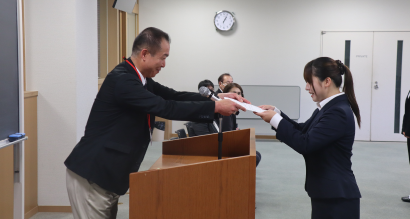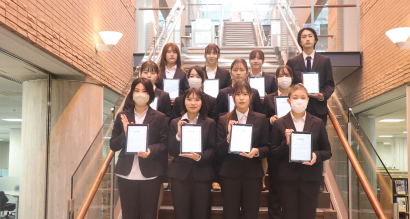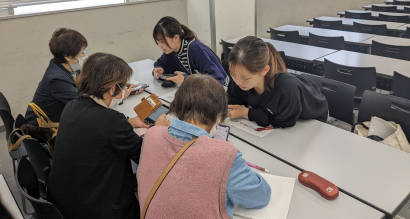JIU Josai International University

Aiming to bridge the digital divide, 15 students appointed as digital promotion committee members
Regional cooperation
2023.11.28

Haruka Yatsuka (right), a second-year student Faculty of Social Work Studies receives the letter of appointment as a representative.

appointed students
A total of 15 students, 6 from Faculty of Social Work Studies and 9 from Faculty of Nursing have been appointed by the Digital Agency as Digital Promotion Committee members. In conjunction with this, a letter of appointment was conferred on November 24th at Chiba Togane Campus by Koki Taniuchi, Dean Faculty of Social Work Studies. This is the first time in the nation that a university has collectively submitted an application and a university student has been appointed as a digital promotion committee member.
The Digital Promotion Committee aims to create an environment in which no one in society can be left behind and enjoy the convenience of a digital society by providing detailed support to those who are unfamiliar with the digital devices and services provided by the Digital Agency. This is an initiative.
Currently, digitalization is progressing throughout society, but a digital divide has also emerged. There are many factors that cause the digital divide, such as differences in income, age, region of residence, race, and education, but in Japan, where the population is aging, there is a gap between the elderly and young people who have relatively little access to the Internet. There is a growing awareness of the issue of the digital divide.
In the "Regional Studies Co-Creation Project," which is one of the common foundation subjects for all faculties, students served as digital coaches and held smartphone courses three times in October and November.
From June, the students took the lead in devising the course content, and in July, the students received a lecture on teaching methods from an external instructor. We began recruiting participants for the course in August, and held courses in October and November in which students taught participants how to use the communication app LINE and the map information service Google Maps.
Approximately 20 people participated in each course, and we received comments such as ``I'm glad that I can now exchange stamps with my grandchildren on LINE.''
The students appointed as digital promotion committee members are expected to play an active role in the field of welfare and medical care in the future, and we will further promote collaboration between health, medical care, and welfare.

Students teaching the basics of LINE in a smartphone course (center)